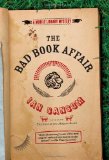Summary | Excerpt | Reviews | Beyond the Book | Readalikes | Genres & Themes | Author Bio

A Mobile Library Mystery
by Ian Sansom
“What?” said Israel.
“Ahh!” said Ted.
“Are you sure you’re all right?”
“Yes. Just, some of these joints haven’t been moved in a while, that’s all. Now. Where were we?”
“You were just—”
“Ach, aye. Yes. In the van, come on. Now.”
“Or?” said Israel.
“Or,” said Ted. “I’ll ring your mother.”
“No,” said Israel. “You wouldn’t.”
“Yes,” said Ted, hobbling toward the door. “I would.”
Israel’s mother had recently made a brief and disastrous visit to Tumdrum, where, as a loud, extravagant, wildly handgesturing, menopausal scarf-wearing, middle-aged north London Jew, she had made quite an impact on the local dour, largely Presbyterian, muttering community. She and Ted had formed an unnaturally close bond, and Ted had spent much time with her, taking her to visit Northern Ireland’s supposed tourist attractions—the place where the Titanic was built,
or example, and the colorful sectarian murals of Belfast— leaving Israel to single-handedly man the mobile during the day and to sit up waiting for their return late in the evenings. They would return flushed and smelling suspiciously of cigarettes and drink. Israel’s mother had successfully managed to embarrass Israel the entire length and breadth of Tumdrum, including at an agonizing dinner at the Devines’, the farm where Israel stayed as a lodger, during which she had flirted outrageously with old Mr. Devine, and had spent all evening urging George to adopt a rigorous daily beauty routine.
“And I’ll tell ye what,” said Ted, gesturing toward the debris in the coop. “When she hears about all this auld nonsense she’ll be over on the next flight.”
“No!” said Israel. “You wouldn’t—”
Ted had his mobile phone in his hand.
“Five minutes,” he said. “In the van. And don’t ye dare waste another moment of my precious time.”
Five minutes later, Israel was in the van.
“There we are, then,” said Ted.
“Humpff,” said Israel miserably.
“I tell ye what, son, ye want to learn to count your blessings,”said Ted as he slammed the van into first and pulled out of the Devines’ yard.
“What?”
“Ouch!” said Ted.
“You OK?”
“My back. Never mind it. Yer blessings. Ye want to count them.”
“Right. All right, Ted, thank you. I’m here, all right. I don’t want to hear any more—”
“Go on, then.”
“What?”
“Count ’em.”
Israel sighed.
“Go on,” repeated Ted. “Count ’em.”
“Ted. I’m really not in the mood. I have a headache and I’m really not well.”
There was a pause of a few seconds.
“Ye counted ’em?”
“I am not counting my blessings, Ted. Thank you.”
“How many d’ye get?”
“I’m not counting blessings!”
“Aye. Because ye’re scared.”
“What? Scared of what?”
“That yer miserable life is not as blinkin’ miserable as ye like to think, ye streak of misery. I tell ye what, as long as ye’re dodging the undertaker ye’re doing OK.”
“Right. Sure.”
“Good. Are ye ready?”
“Do I look like I’m ready?”
“Count them.”
“All right. All right,” said Israel, who had learned from long experience that the only way to conclude an argument with Ted was to lose it.
Excerpted from The Bad Book Affair by Ian Sansom. Copyright © 2010 by Ian Sansom. Excerpted by permission of HarperCollins Publishers. All rights reserved. No part of this excerpt may be reproduced or reprinted without permission in writing from the publisher.
The single biggest problem in communication is the illusion that it has taken place
Click Here to find out who said this, as well as discovering other famous literary quotes!
Your guide toexceptional books
BookBrowse seeks out and recommends the best in contemporary fiction and nonfiction—books that not only engage and entertain but also deepen our understanding of ourselves and the world around us.